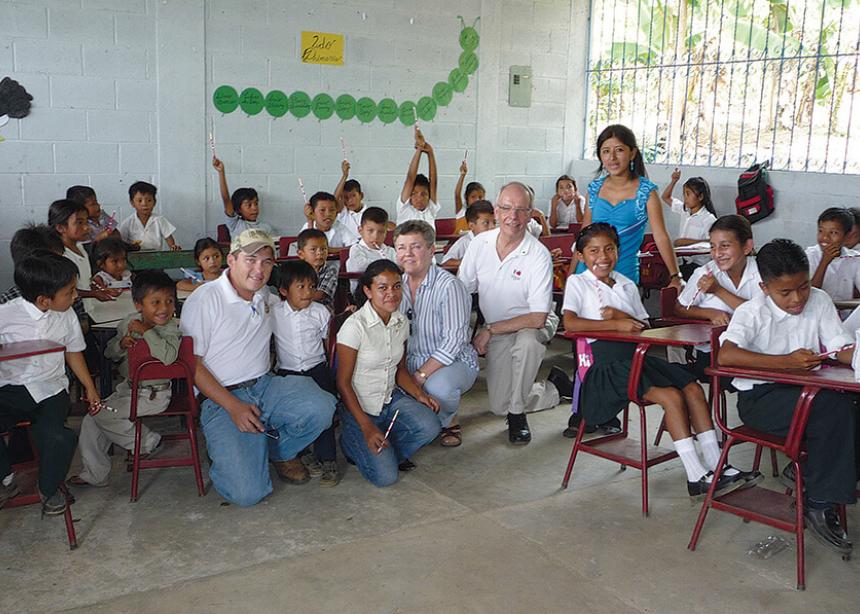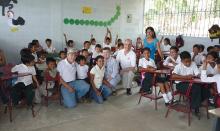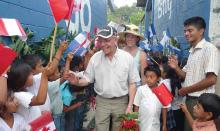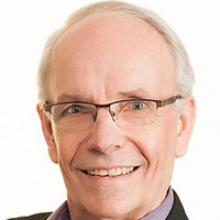Peter Neufeldt lives out his commitment to Jesus’ way of peace as a member of his church and as a member of the Rotary Club. “There are so many different ways of making peace,” he says.
An active member of Grace Mennonite Church for many years, Neufeldt recalls a time when the congregation chose names for its various committees. “Peace” was intentionally paired with “service” to create a name for one committee. “We were really looking at what we could do, action-focused,” Neufeldt recalls. “So it wasn’t just philosophical, that we would sit around and talk.” And so the Peace and Service Committee came into being.
Under the committee’s direction, the congregation built peace through service by sponsoring refugees. “I don’t know how many refugees we’ve sponsored,” says Neufeldt, “but I think it’s over 35 families, the first ones being from the Vietnam War.” He adds, “The first family we sponsored are still members of our church.”
In addition to sponsorship, the congregation, in partnership with the local food bank, has helped refugees acquire employable skills that would get them out of the low-paying jobs in which they typically found themselves.
As a member of a local Rotary Club, Neufeldt finds even more avenues for making peace through service. One of Rotary’s six key initiatives is peace and conflict resolution, says Neufeldt. Rotarians work at this within their communities, as well as internationally. Locally, a program called Chili for Children provides lunches for Regina school children from low-income families. Another program supports the Regina branch of the Canadian Mental Health Association.
An international initiative which Neufeldt is particularly passionate about is the Ripple Effect Program, which began in 2000, after a church youth group from Canada visited Guatemala and witnessed the lack of educational opportunities in rural communities there. The Canadian youth group, whose leader was a Rotarian, wanted to build a school for their new Guatemalan friends. By 2001, the first school had been built. To date, Rotarians have helped build 70 schools in Guatemala, through the program, most of them in rural areas. The positive effects of the program have rippled outward, says Neufeldt, not only with the number of schools built but also with the quality of education.
In 2009, Neufeldt and his wife, Janet, together with fellow Rotarians, Peter and Marg Peters, travelled to Guatemala to see first-hand how the program works. Rotary Clubs in Canada partner with a club in Guatemala to ensure that funds for the program are administered fairly. Local tradespeople are employed to build the schools. Strong parental support is essential.
“In one particular community, when we were there, there was a Mayan lady who begged us to build a school,” says Neufeldt. “She couldn’t speak Spanish. They translated from Mayan to Spanish to English.”
Although there was a rough shelter of bamboo slats, a tin roof and wooden benches or tree stumps for seating, “when it rained the water ran through the classroom and the kids sat with their feet in the mud,” Neufeldt says adding, “The teachers did the same.”
Rotary did build a school in this community, says Neufeldt, and this year they purchased 18 computers for the school.
“They take such pride in their school,” says Neufeldt. “It has just changed the community.”
Although Rotary is non-religious and non-political, Neufeldt says many of its members are Christian. The core values of Rotary are compatible with the Christian faith, he says, adding that being involved in Rotary has also given him opportunities to form friendships with people of other faiths.
Rotary “has helped to give voice to my faith,” says Neufeldt. “I find that Rotary has so many parallels to [Mennonite Central Committee] and yet, for me, has an easier, hands-on application.”
Within the service club Neufeldt found he could make friends and live out Christ’s Great Commission, “finding service opportunities that help me to ‘go into all the world,’ first of all the world in Regina, but then discovering the international opportunities with The Ripple Effect Program.”
Neufeldt has been involved in leadership at both the local club and district levels. For a number of years he has been part of a district training team, helping to develop leadership in each of the district’s 47 clubs. In 2017, Neufeldt will serve as district governor.
He finds working with fellow Rotarians very rewarding. “We’re building bridges of understanding, bridges of peace. It’s a way of going out into the world.”





Add new comment
Canadian Mennonite invites comments and encourages constructive discussion about our content. Actual full names (first and last) are required. Comments are moderated and may be edited. They will not appear online until approved and will be posted during business hours. Some comments may be reproduced in print.